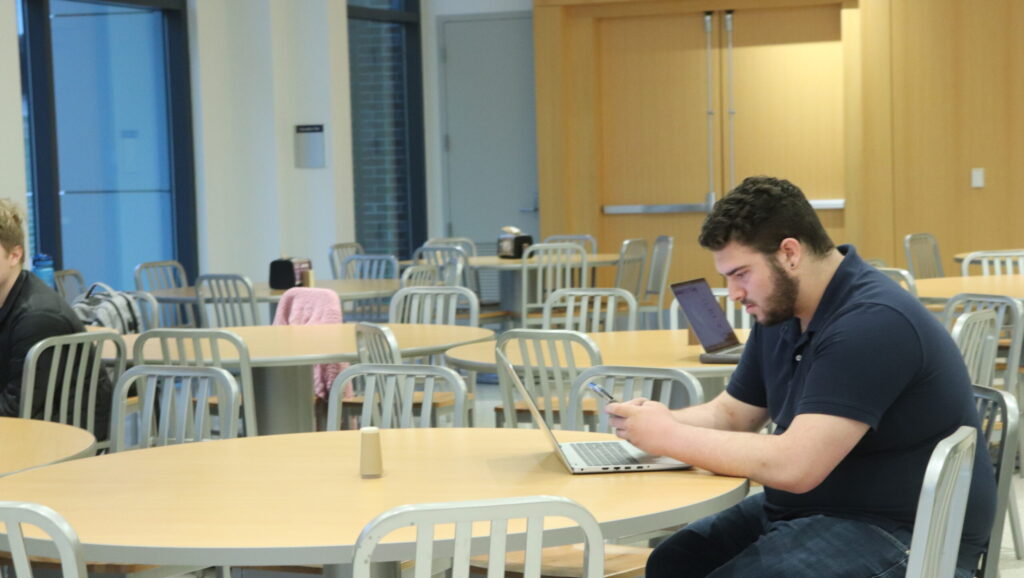Originally published in the Western Carolinian
In February 2023, student Jacob Dillhyon messaged the Carolinian on Instagram asking for his experience with WCU Dining Services to be told.
His message:
“This is regarding a string of messages I’ve had with Dining Services regarding their fatphobia they are presenting as well as discrimination against those with medical needs and so forth. If I go into a dining hall and ask for an extra portion, I am usually told no and that they are only allowed to serve one portion. This is not the policy and I got confirmation of that. However, when bringing this up to dining services, I am told that ‘it’s the new hire’s fault’ and that I should ‘get a dietitian.’”
The event that sparked the story
Dillhyon had emailed Campus Dining on Feb. 6 to express his concerns about the portions provided at the dining halls. Isabella Senatore, Catamount Dining marketing manager, emailed back to explain that the dining halls are an “all-you-can-eat” facility and there might have been a miscommunication. Servicers are to give the customer another portion upon request. Later this issue would be brought to the attention of management for staff to be trained on. If this were to happen again, he was instructed to go to a manager.
Jeffrey Marshall, the resident district manager, emailed Dillhyon at the same time as Senatore to inform him that this should not have happened and invited him to come to the Dining Service Advisory Board (DSAB) where he could address any concerns.
In response, Dillhyon wrote his concerns “had not been addressed as to how this will be fixed” and wanted “acknowledgement of how these actions are of consequence to students who may not fit a predetermined mold that is allowed to receive the amount of food asked for in one sitting.”
Senatore responded to his second email to state the policy again and that “this concern is likely due to new staff or miscommunication on our server floor.” Later in the email, she states that he is welcome to speak with her or “our registered dietician on any issues students may be having with food insecurities. We understand that all students or customers come in many different shapes, sizes, appetites, lifestyles, and so forth. To help navigate dietary and lifestyle restrictions, our dietician has and can meet with any student to better help anyone who may feel restricted in eating.”
This response appalled Dillhyon. He was upset because after bringing this concern to them, he saw their response as “you should see a doctor about that” when they referred him to the registered dietician. He saw this as fatphobia and discrimination. He felt that this issue shouldn’t be blamed on new student workers or the problem shouldn’t be handled by him talking with a manager every time it happens.
Dillhyon spoke with a family friend who is a registered dietician from Duke University Hospital. They viewed the emails as offensive, and the statements could send a dangerous message. They did not understand how their portioning was nutritional and why a student should go to a dietician for this concern.
Not just Dillhyon
The Carolinian interviewed a student that reached out to Dillhyon after he posted about the situation on social media. She wished to remain anonymous because she didn’t want her personal information to be known.
This student was facing the same issue with portioning at the dining halls. She is anemic, meaning she needs iron or she will pass out. She mostly eats breakfast on campus due to her class schedule. She has had an issue with this since her first year at Western.
“The portions were nowhere near what I needed for breakfast, especially with me being anemic,” She explained. She was constantly denied a second portion and was instructed to go back in line, but she did not have time to wait in the long lines. Most days, she eats from the pod-market and eats snacks for breakfast.
She acknowledged that she understands that waste is a big issue but she stated that “students should just get what they want… the waste part falls onto the student.” She has since gone to a nutritionist because of her constant weight loss.
Dining Service Advisory Board meeting
On Feb 16, DSAB held a meeting where Dillhyon addressed the entire board about the portioning issue and his concern of being told to see the dietician.

“…it should not have had to get this far. I would rather not have to come to a board meeting and explain my grievances with the way my concerns were handled. But that leads me to the thought how many other students wanted to speak up but felt shamed by dining services. It sets a precedent that people with nonstandard body types should only eat the amount that the dining hall thinks is right for them, which, if perceived by someone who’s already struggling with insecurities around foods such as body dysmorphia or bulimia, could have extremely harmful consequences,” Dillhyon expressed at the meeting.
After Dillhyon’s speech, Robert Walker, associate vice chancellor of auxiliary enterprises, explained that this was most likely miscommunication and confusion amongst the staff due to a training issue. “I appreciate you bringing this to us. You shouldn’t have had to do that… [we] really appreciate your comments about how we recommend the registered dietician,” Walker said.

The Carolinian reached out to Walker and Marshall via email after the meeting to see if the issue was being resolved.
The two expressed that their offices on the second floor of Brown Hall are always open if someone needs to address a concern. They also both noted that dining’s program “Voice of the Consumer” allows students to anonymously give feedback. The QR codes can be found on the back of napkin holders in the dining halls.
When asked about what a student should do in this situation, Walker replied with this:
“It is part of every manager’s job to make sure we meet the needs of our students, and I encourage students to make use of managers as a resource. From prior DSAB interactions I know that some students view asking for a manager as a complaint [and/or] confrontation, but in Catamount Dining we truly appreciate that kind direct feedback. It’s how we get better and ensure needs are met in a timely fashion.”
A meeting was held with all the managers where Marhsall addressed this training and miscommunication issue. He sent out an email as well.
The email reads:
“Team,
I want to reiterate what I discussed on our weekly Teams management call about guests requesting extra portions of food. Please communicate to all of our associates that, any time a guest requests extra portions that they be given what is requested. Make sure they understand the importance of of what is considered a portion, adhering to the nutritional value or a portion, and that they do not just “scoop” food on a plate. Rather, each serving is a portion no matter how many are requested.
Our guests pay for admittance to an ‘all you can eat’ program and while we cannot control what they waste, it is still important that they get what they pay for.”
After hearing of the changes, Dillhyon expressed his gratification.
“I’m glad this was able to come to a peaceful resolution and we were able to talk it out in person. I just want to be able to go in the dining hall and be able to eat what will keep me satiated, and since this situation has begun resolving, I feel like I can,” Dillhyon said.
The Western Carolinian acknowledges Dillhyon and applauds anyone who speaks up with meaningful concerns.


